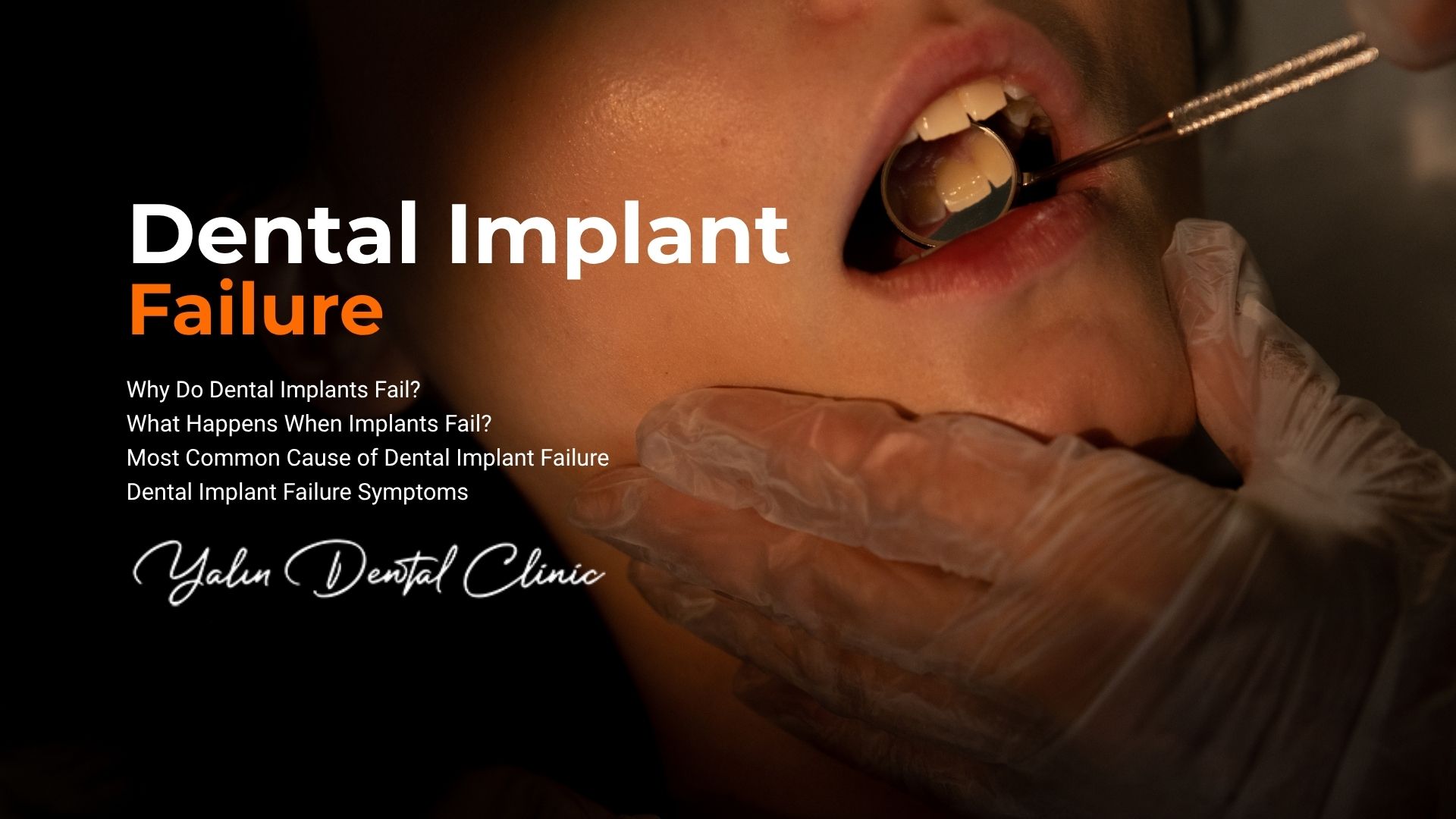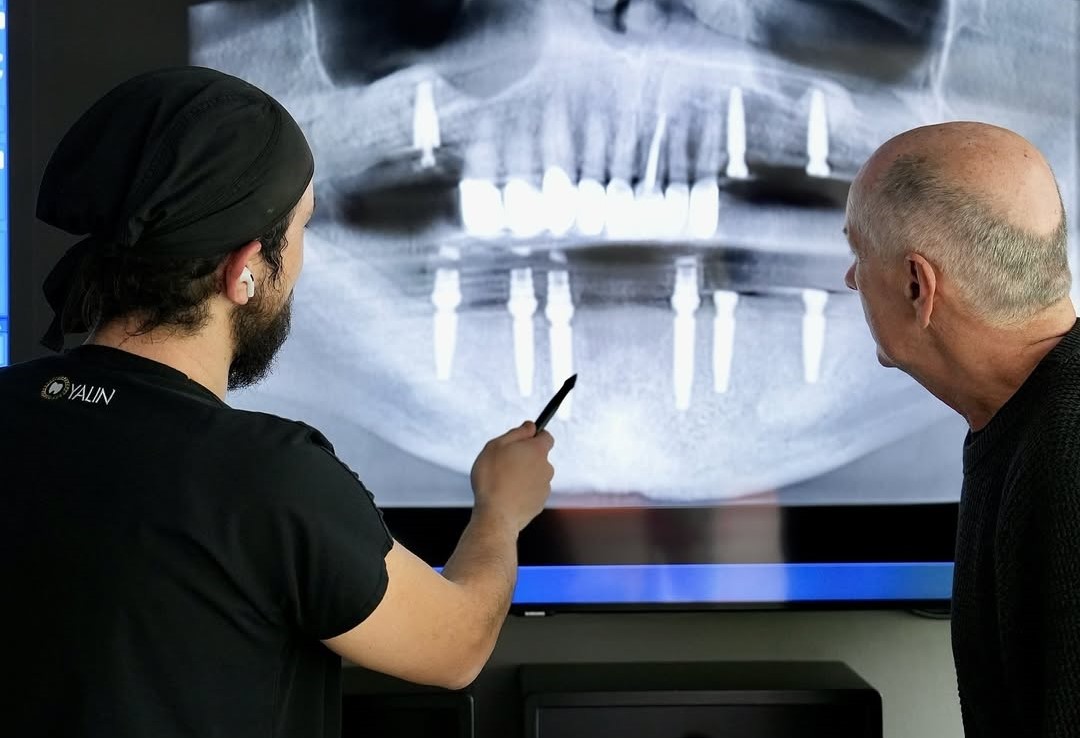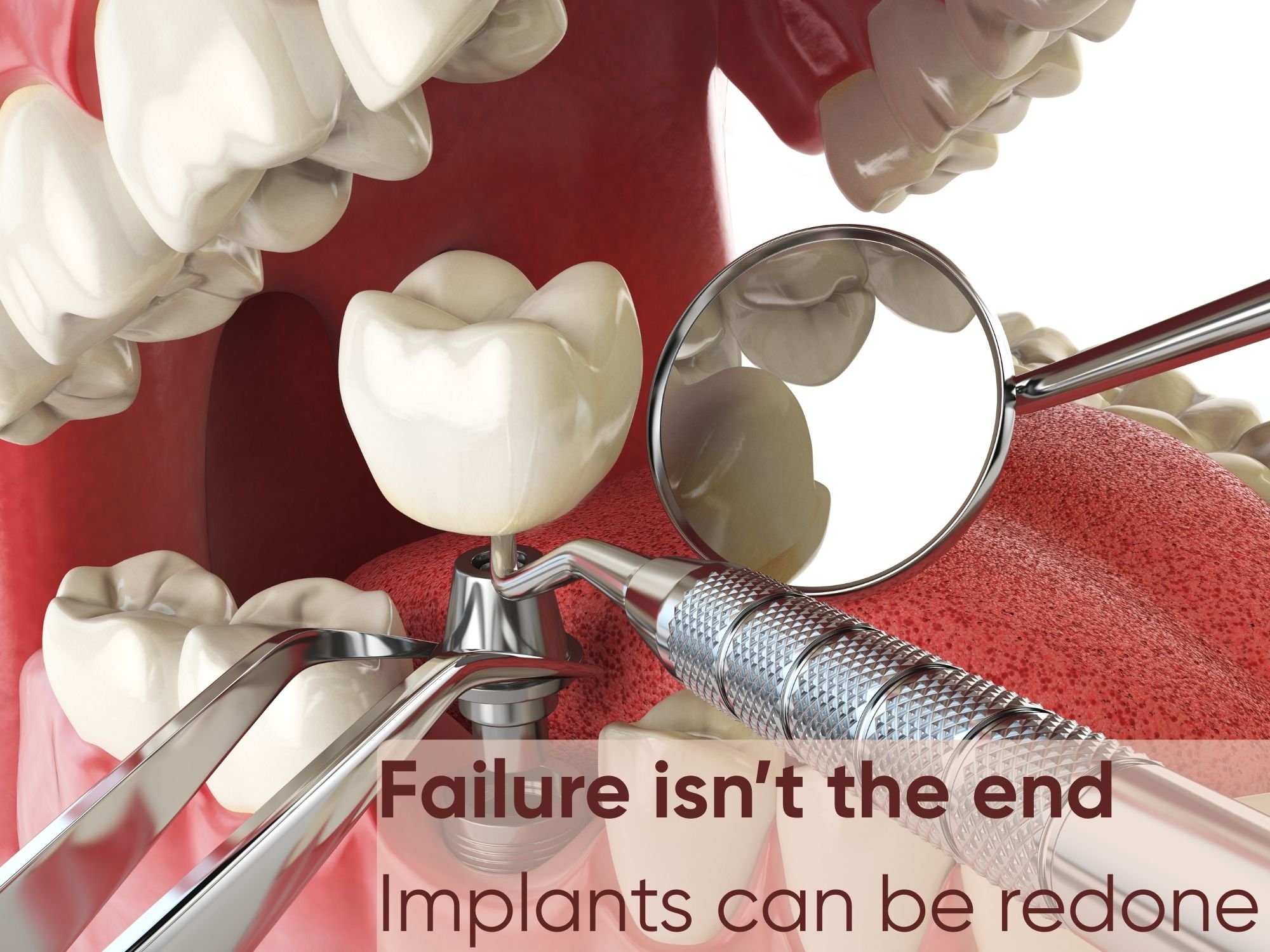Failed dental implant
Dental implant treatment has become the preferred option for many people who have experienced tooth loss due to its ease of use and natural appearance. However, certain conditions must be met before, during and after treatment for it to be successful and for the implants to last as long as possible.

If these conditions are not met, the lifespan of the treatment will be shorter. Difficulties using the implant may be experienced. Repeated surgical operations may be required.
Therefore, before undergoing this surgical procedure, your health condition should be thoroughly analysed, any necessary preliminary treatments should be carried out, the operation should be performed carefully by a specialist dentist, you should take care and be sensitive to the procedure afterwards, and you should not neglect dental check-ups.
Why do dental implants fail?
The successful outcome of dental implant treatment depends on a number of factors. It depends not only on the dentist but also on the patient’s attitude. The dentist must have sufficient experience to perform the treatment carefully and correctly. The patient must meet the necessary health conditions and carry out post-treatment care properly and completely. They must also not neglect dental check-ups after the treatment.
The unsuccessful outcome of dental implant treatment can be examined within three different processes.
Failures occurring in the early stage
During the osseointegration phase, mistakes can lead to the failure of dental implant treatment. This period covers 3-6 months after the dental implant is placed through surgery. Early-stage mistakes:
- Failure to optimally adjust the tightness of the dental implant can lead to failure. The dental implant should not be too tight or too loose.
- If cooling is not performed during drilling, bone burn occurs.
- In patients with insufficient bone volume and density, the dental implant cannot integrate into the bone. Therefore, bone grafting should be performed first in such cases.
- The surgery must be performed in a sterile environment in compliance with hygiene standards. Otherwise, infection can cause dental implant treatment to fail.
- Heavy smoking disrupts blood circulation. Smoking by the patient after treatment negatively affects the integration of the implant into the tissue.
- Chronic diseases such as uncontrolled diabetes and immune system disorders can also lead to unsuccessful treatment outcomes.
Failures occurring in the late stage
In the late stage, failure may become apparent over the long term. Undesired conditions may appear over months or even years.
- The most common cause of late-stage failure is peri-implantitis, which is an infection occurring in the gum and bone. This infection starts in the gums and progresses to reach the bone where the implant is placed, causing erosion of the bone tissue. Over time, the implant cannot integrate with the bone for this reason. Heavy smoking, poor oral hygiene and uncontrolled chronic diseases are among the causes.
- After the prosthesis is placed, the force must be distributed evenly. In other words, the pressure applied during chewing must be distributed evenly. Otherwise, the load is placed on a specific area of the prosthesis. This causes the implant to loosen over time.
- Incorrect construction of the crown and bridge can also cause the screw to loosen.
- Insufficient care or biological incompatibility can negatively affect the success of dental implant treatment.
- Poor quality dental implants and non-compliance with standards also make treatment unsuccessful.
Failures due to patient errors
Dental implant treatment is a complex procedure that requires the expertise of a dentist and clinical competence. It is a complex procedure which, if necessary, must be supported by complementary treatments, taking into account the patient’s health conditions. However, no matter how flawlessly the treatment is carried out, the care shown by the patient during and after the procedure is indispensable to its success. For this reason, attention should be paid to the following points.
- Insufficient oral hygiene is one of the most common mistakes. Oral hygiene must be carried out regularly and carefully. Otherwise, the bacterial level in the mouth increases, leading to gum disease and infection.
- Heavy alcohol consumption and smoking negatively affect circulation and can impact the success of implants in the early or late stages.
- If chronic diseases such as diabetes, immune disorders and osteoporosis are not controlled, they can negatively affect the stability of the dental implant.
- Neglecting regular dental check-ups can prevent oral problems from being diagnosed and treated early. This can lead to implant loss.
What happens when implants fail?
The solutions applied in the event of dental implant treatment failure may vary depending on when and why the failure occurred. Each problem should be considered in this context, and a solution sought accordingly.
- In the early stages, if the implant does not integrate properly, it cannot gain a stable position and becomes loose. This manifests as pain when chewing. If this happens, the implant is removed in a second surgical procedure. Once healed, if there is sufficient bone, the implant is reinserted. Otherwise, bone grafting is first used to strengthen the bone tissue. Then, the dental implant is placed in the bone.
- If failure occurs in the late stage due to an infection caused by gum disease, the symptoms are gum bleeding, gum recession, pain and swelling. In such cases, the dental implant loses its fixed position and begins to loosen. If treatment is sought early enough, surgical cleaning, laser treatments, and bone grafting procedures can solve the problem. Early detection of the problem is important for early treatment. For this reason, regular dental check-ups should not be neglected. If the disease progresses undetected, the implant must be removed by surgical intervention. Once the infection has been eliminated, bone grafting is performed, and, once healed, the dental implant treatment is resumed.
Who is responsible for dental implant failure?
There are many factors that can affect the success of dental implants. Therefore, there may be different reasons why the treatment does not achieve the desired outcome. Some of these reasons originate with the dentist, some with the patient's negligence; and some with environmental factors or the patient's biological structure.
Failures originating from the dentist
Some mistakes may result from the dentist overlooking the patient’s health conditions or from the dentist making incorrect decisions during the procedure. A good treatment process begins with an accurate diagnosis of the patient’s condition. If the patient has lost bone or tissue, bone and tissue grafts should be used to improve their condition. If the patient has gum disease, this should be treated first. If the patient has chronic diseases such as diabetes, heart disease or immune disorders, these issues must first be brought under control. If necessary, interdisciplinary treatment should be applied. Without these preliminary treatments, dental implant treatment cannot be successful or long-lasting. Failing to address these issues is considered a dentist’s error.
Sterilisation must be given great importance throughout the surgical procedure. Otherwise, infection will cause the treatment to fail.
Excessive heating of the bone during the procedure causes erosion and prevents the implant from integrating properly.
If the implant is placed at the wrong angle or in the wrong position, it will not be comfortable or long-lasting.
The prosthesis must be designed and fabricated according to the structure of the mouth. Force during biting must be distributed evenly. Otherwise, the implant will loosen over time.
Patients should be thoroughly informed about how to manage the treatment process and the post-treatment period, including care procedures that require careful attention.
Failures originating from the patient
No matter how professional and careful your dentist is when applying dental implant treatment, this alone is not enough if the patient does not take care. Therefore, it is very important that you follow your dentist’s recommendations. Otherwise, the treatment will fail in the short or long term.
Patients must perform regular and meticulous oral hygiene procedures. Otherwise, gum problems and implant loss can result. Heavy smoking and alcohol consumption can negatively affect blood circulation. Over time, this can cause erosion of the bone where the implant is placed, prolong the healing process and, in some cases, make it impossible.
Neglecting regular dental check-ups can prevent early diagnosis and treatment, which may result in implant loss.
Failure to follow the dentist’s recommendations during treatment, the healing period and subsequent usage can negatively affect the long-term health of the implant.
Uncontrolled chronic diseases can also lead to an unhealthy process of using the implant.
Environmental and genetic conditions
As with any surgical procedure, dental implant treatment carries certain risks, known as medical risks. Neither the patient nor the dentist is responsible for these risks.
These include the implant not integrating despite all bone conditions being met, progression of chronic diseases, failure related to genetic characteristics, and an imperceptible manufacturing defect in the implant.
Most common cause of dental implant failure
Dental implant treatment is highly successful when performed by an experienced specialist dentist under the right clinical conditions and with the correct patient behaviour. However, failure can occur if these conditions are not met.
According to records, the most common cause of failure is peri-implantitis — infection around the implant resulting in bone loss. Peri-implantitis initially manifests as bleeding, swelling and discharge of the gums. In the middle stage, gum recession becomes apparent. Pain and swelling occur during chewing. In the advanced stages, the implant loses its stable position and begins to loosen.
Dental implant failure symptoms
After receiving dental implant treatment, certain symptoms can indicate undesirable conditions. These symptoms can appear in the early or late stages and require you to see your dentist immediately. The most common symptoms are listed below.
- Pain while chewing or during daily activities
- Swelling or colour change in the gums
- Gum bleeding
- Pus or inflammation in the area where the implant is placed
- Loosening of the implant and loss of its stable position
- Gum recession
- Metallic taste and odour in the mouth
- Detection of bone and tissue erosion in X-ray imaging
Early implant failure symptoms
Symptoms of early-stage failure in dental implant treatment appear after the surgical intervention. This occurs when the integration of the implant into the bone does not take place as planned. The signs that appear during the healing process are as follows:
- Loosening of the implant
- Pain that does not decrease after the operation
- Swelling or colour change in the gums that does not subside
- Pus or inflammation in the area where the procedure was performed
- Metallic taste and odour in the mouth
- Feeling of looseness in the implant
- Bone and tissue loss, as detected through imaging.

Dental implant failure treatment
In early-stage failure, the implant is usually removed, infection treatment is applied if necessary, and healing is awaited. Then, if needed, bone and tissue grafting is performed. Afterwards, dental implant treatment is reapplied.
In the case of late-stage failure, professional cleaning is performed by the dentist. All infection is removed. The patient is provided with more detailed information on maintaining oral hygiene. This prevents the same problem from recurring. If this treatment is insufficient, more detailed cleaning is carried out using flap surgery techniques. If advanced bone and tissue loss has occurred, the implant is removed and bone-tissue grafting is applied. After healing, if bone density is sufficient, implant treatment is reapplied.
If technical and mechanical problems occur, the implant treatment or prosthesis design is repeated.
If failure is caused by chronic diseases, the illness is attempted to be brought under control. In such cases, the dentist may increase the frequency of check-ups.

Frequently Asked Questions
Can a dental implant fall out?
Yes, a dental implant can fall out. This is usually because the screw holding the implant or the prosthesis has come loose. Either situation is serious. This indicates that the bone and the implant have not fused sufficiently or have separated. If this happens, you should consult a dentist immediately.
How common is it for dental implants to fail?
The success rate of dental implant treatment is between 90% and 98%. In other words, the failure rate is between 2% and 10%. In order for this treatment to be successful, the dentist must be a specialist with experience in the field; the clinical equipment and sterilisation must be sufficient; and the patient must provide the necessary care and attend dental check-ups.
Why does my dental implant not feel right?
There may be many reasons for this. If you feel that something is wrong even after the healing process has finished, it may be due to an incorrectly designed, fabricated or applied prosthesis, gum disease, or an imbalance in the load on the implant. We recommend that you see your dentist as soon as possible.
Can your gums reject implants?
The gums do not reject the implant. However, if the gum becomes unhealthy or infected, this has a negative effect on the success of the implant. If gum disease is left untreated, it will progress and cause the implant to be lost. For this reason, it is essential to maintain good oral hygiene on a regular basis.
Can a failed dental implant be redone?
Yes, dental implant treatment can be repeated following failed treatment. However, before repeating the treatment, any underlying issues must be addressed, and, if necessary, bone and tissue healing and strengthening must be ensured.

Please contact us for more information.






